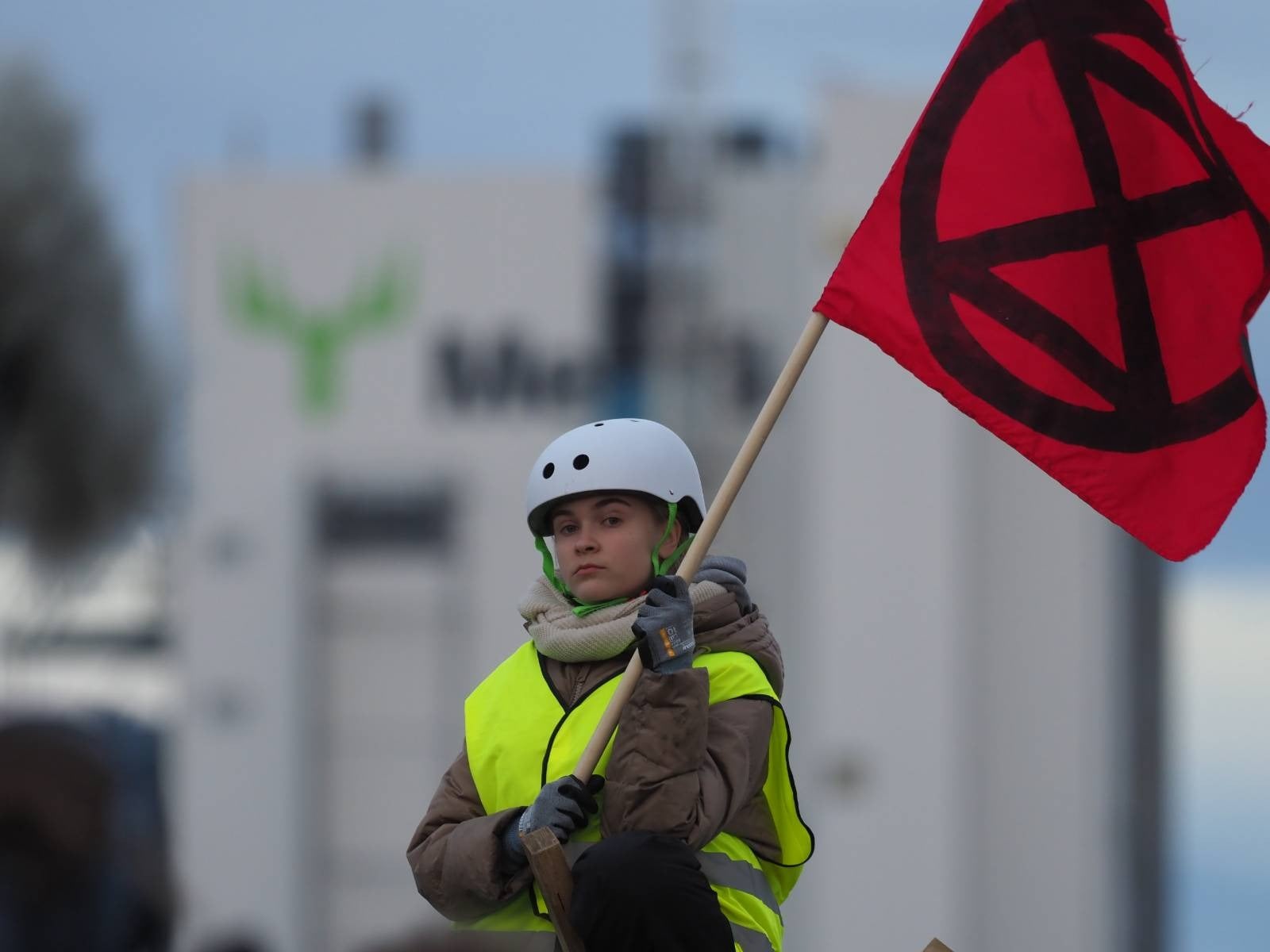
A Finnish rebel blockades a pulp mill that will turn forest trees into packaging.
This issue: Finland Rebels | NYC Rebels | Australia Rebels | Just Stop Oil UK |
Dear rebel,
COP27 has begun, but expectations are at rock bottom.
On top of the usual charge sheet (Global North intransigence, oil lobbyist interloping, serial broken promises) comes the fact that this year’s UN climate summit will be effectively greenwashing a police state.
Egypt’s military government has killed, imprisoned and tortured thousands of peaceful activists since its rise to power in 2013. Protest is de facto illegal in the country. COP27 will be held in a region reserved for tourists and a tiny elite, which the Egyptian public cannot access, and where foreign activists must book slots to protest in a car park.
If COP27 manages to achieve anything of note we will cover it in our next issue, but for now we have much more promising things to focus on, like global rebellion.

One rebel koala is plucked from his tripod outside a state-owned logging company in Melbourne, Australia.
In Action Highlights we report on how Finnish rebels targeted the logging companies turning their forests into packaging, how New York rebels targeted the CEOs of the biggest fossil fuel financiers in the world, and how Australian rebels targeted loggers, financiers and more in not one but two major rebellions across the island’s south coast.
We also dedicate this month’s Solidarity Corner to Just Stop Oil, who have just completed four weeks of daily disruption in London. The group’s provocative tactics, including throwing soup at (glass-protected) artworks, have drawn a lot of criticism, even from supporters of XR.
But the evidence shows that negative coverage of peaceful protesters doesn’t harm the underlying cause. Instead, it creates space for debate of the wider issues and increases support for the more moderate flanks of the same cause.

A Just Stop Oil activist is arrested in London, one of 718 arrests in the last month.
We live in a surreal world where a painting being apparently damaged causes more outrage than hundreds of thousands of people losing their lives and livelihoods to floods and drought in Pakistan and Somalia.
The Global North, through its historic and continuing use of fossil fuels, has directly caused that intense and ongoing suffering. It should weigh on all of us, and instead of condemning the protesters harmlessly highlighting it, we should aim our ire at the politicians in Egypt who are grossly perpetuating the injustice.
The Global Newsletter is brought to you by XR Global Support, a worldwide network of rebels who provide grants, training, and tech to help our movement grow. We need money to continue this crucial work.
Action Highlights
Save The Forests! Rebel For Nature!
5 - 14 OCT | Helsinki/Espoo/Kemi, Finland
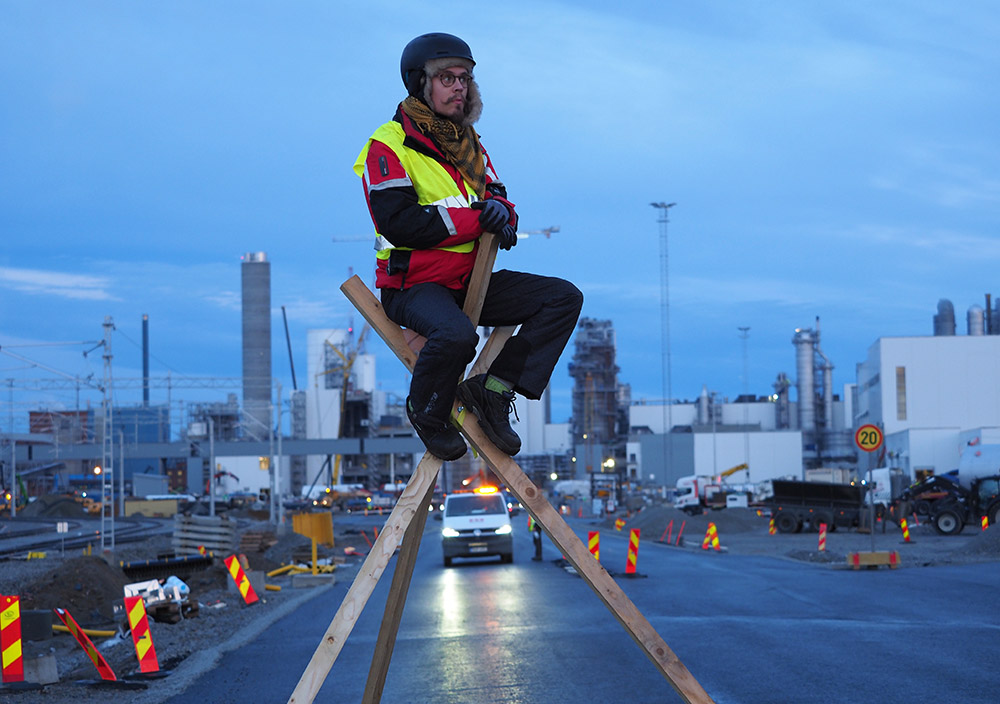
A rebel blockades a huge pulp mill built to turn forest trees into packaging.
After a night of poetry, music and dance in a Helsinki park, the rebels got to work. 300 of them blocked a major highway beside their parliament, 46 were arrested by police throughout the day, and the action made it onto the evening news. The ‘Rebellion for Nature’ was off to a rowdy start.
Ecological decline and the climate crisis go hand in hand, and Elokapina (XR Finland) focused their autumn rebellion on protecting Finland’s forests, empowering the indigenous Saami people whose culture depends on them, and ending factory farming, which the government still subsidises. Lastly, they demanded Finland pay its climate debts to the Global South.
30 rebels rallied outside a pulp mill in Lapland, still being constructed by Metsä Group, a logging corporation that turns old-growth trees into disposable packaging. Once complete, it will be the largest pulp mill in the Northern Hemisphere. Police were present but did not intervene. After blocking traffic to the site all day, the rebels were allowed to walk home.
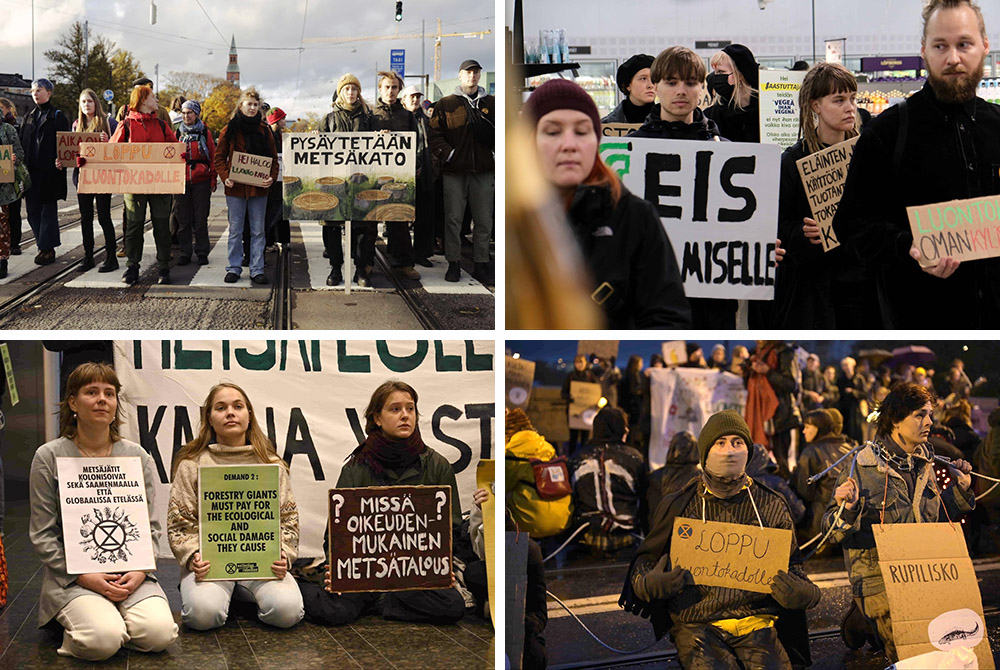
Rebels blockaded highways, marched through supermarkets, occupied logging companies, and took over a bridge to highlight Finland’s fragile ecology.
The next day, Elokapina launched simultaneous blockades of Metsä Group’s, and two other major logging company’s headquarters. Rebels swarmed into the entrances and lobbies, gluing themselves to walls and silently holding signs with their demands. The demonstration at Metsä Group lasted more than 6 hours.
Funeral marches were held in outlets of two major supermarkets for fuelling animal-based food production, and Red Rebels joined a slow march down the stairs of the Finnish parliament building to highlight the many native animal species in danger of extinction.
The rebellion closed as it had begun, with hundreds of rebels blockading the road in front of the Finnish parliament. With silence from the government, the blockade moved to a major bridge, where rebels chanted in solidarity as police arrested dozens of their comrades locked together in a symbolic circle.
More than 700 rebels participated in the rebellion, with a quarter of those newly trained-up recruits. There were fewer arrests this time, thanks to a tactical shift away from blockades to more diverse actions, but the campaign still attracted extensive media attention. And this time there were no run-ins with neo-Nazis.
Follow Elokapina on Facebook and Twitter.
Rebel Alliance Blockades Fossil Fuel Funders
24 - 29 OCT | New York, USA
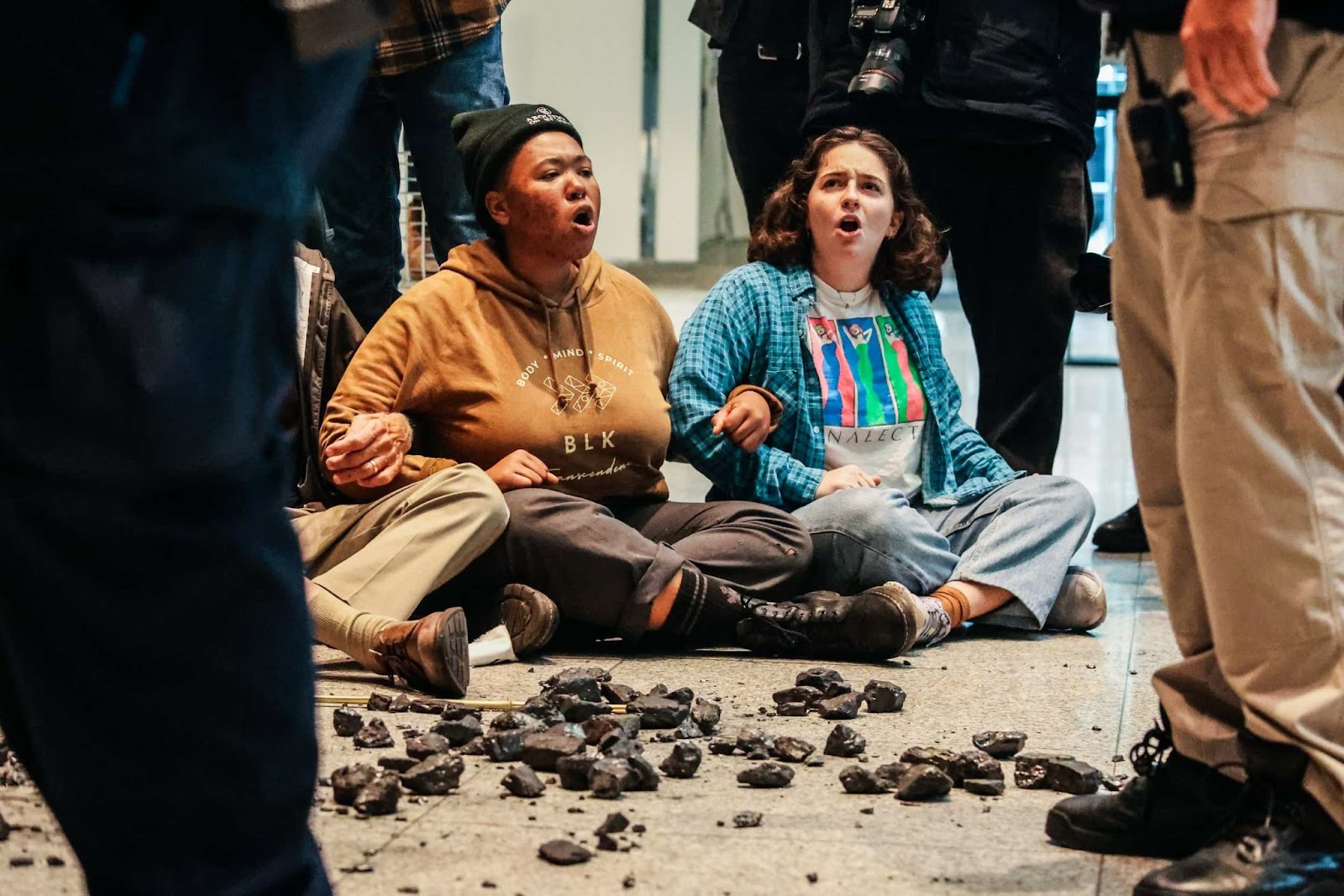
Protesters dump coal across BlackRock’s lobby floor. Photo: Adrian Childress
XR NYC joined with a coalition of climate activist groups for six days of action across the city. 49 protesters were arrested during the campaign, which was coordinated by New York Communities for Change and involved multiple blockades of Park Avenue, home to some of the most ecocidal corporations on the planet.
As well as launching actions involving more than 600 people, the coalition scored an early publicity hit by interrupting a live TV interview with a climate-denying senator. ABC, the channel broadcasting the interview, covered the climate crisis for a measly five and a half hours over the entirety of 2021.
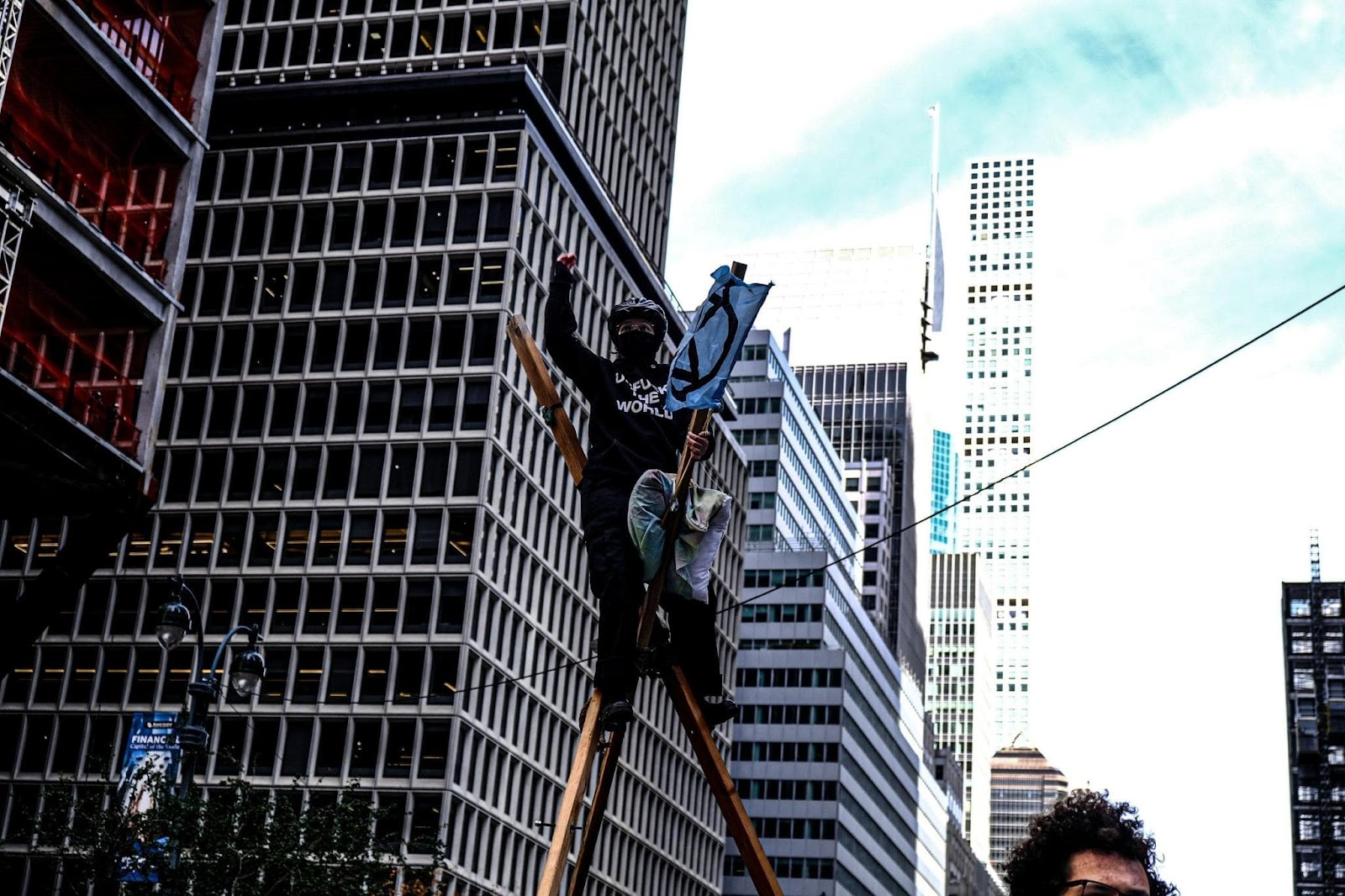
A rebel outside the world’s dirtiest bank, JPMorgan Chase. Photo: Katie Godowsky
The rebel alliance first shut down Park Avenue outside BlackRock’s headquarters, the world’s largest asset manager, and another vast and unrepentant investor in fossil fuels. 15 activists were arrested for blocking traffic. Another 10 were arrested the next day for occupying BlackRock’s lobby and dumping coal across its floor.
Activists used two tripods to shut down Park Avenue again outside investment bank JPMorgan Chase, the biggest funder of fossil fuels on the planet. Its CEO has persisted in promoting fossil fuel investment and extraction, while shareholder efforts to push the bank away from financing ecocide have failed.

They came for CEO brains, but made do with tomato soup. Photo: Adrian Childress
Finally, the CEO’s of KKR and Blackstone woke up to find ‘zombie’ activists eating outside their elite apartment block. The private equity groups both own multiple fossil fuel companies and are answerable only to their elite investors. Over half of Blackstone’s investments are in fossil fuels, while for KKR it’s over three quarters. Dumb and dumber.
The week of actions was timed to coincide with the 10th anniversary of Superstorm Sandy, which devastated parts of Manhattan and the New Jersey coast. The risk of more catastrophic damage rises with every year that the current system continues.
Keep up-to-date with XRNYC via its website and Twitter feed.
Australian South Springs Two Rebellions
8 - 22 OCT | Victoria & South Australia, Australia
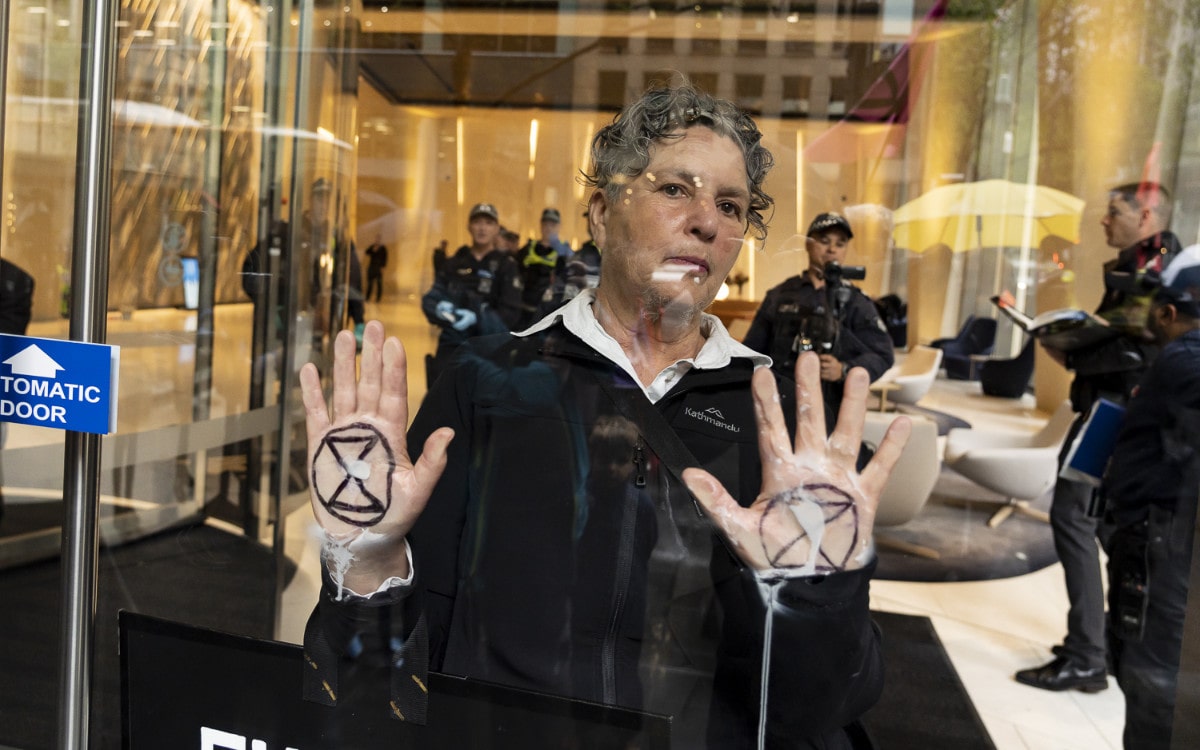
Rebels glue themselves to Australia’s sovereign wealth fund in Melbourne for investing in ecocide. Photo: Matt Hrkac
Throughout October, rebels in Victoria and South Australia have marched, blockaded, and even set sail to demand an end to fossil fuel investments, an end to the destruction of native forests, and an end to government climate inaction.
The action began with a trip to Corio Bay, on the unceded territory of the Wadawurrung/Wathaurong people of the Kulin Nations, where rebels took to the waves on kayaks and boats (including a beautiful pink one) to block an oil tanker.
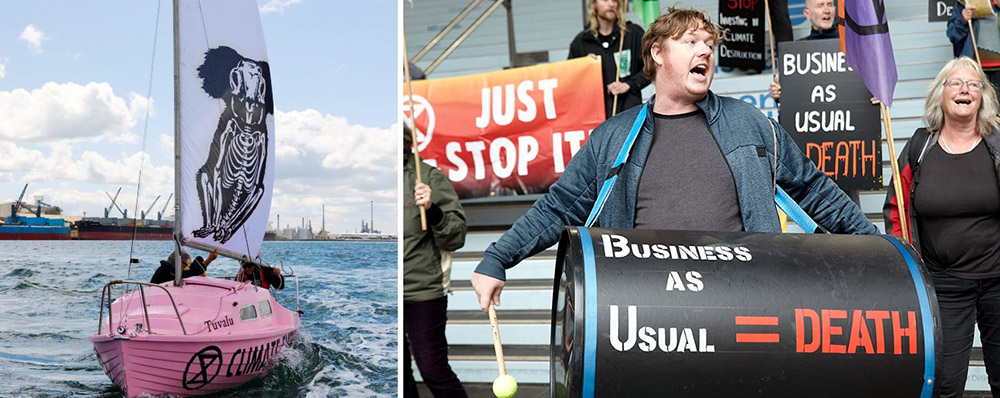
The pink boat returns (hooray!) for the Corio Bay action. Right: a rally in central Melbourne against the financiers of the climate crisis. Photo: Danielle Judd.
Days later, rebels in Victoria reforested the road outside a rapacious state-owned logging company, disrupted the AGM of a major fossil fuel funding bank, and, in collaboration with other climate justice groups, swarmed the streets of Melbourne. There, two rebels made international headlines by gluing themselves to a Picasso painting.
Meanwhile, hundreds of rebels took action at the Asia Pacific Oil & Gas Conference, an event held in Adelaide despite the fact that the South Australian Government has declared a climate emergency. Undeterred by a heavy police presence, rebels blocked the site entrance and disrupted the summit for its three-day run.
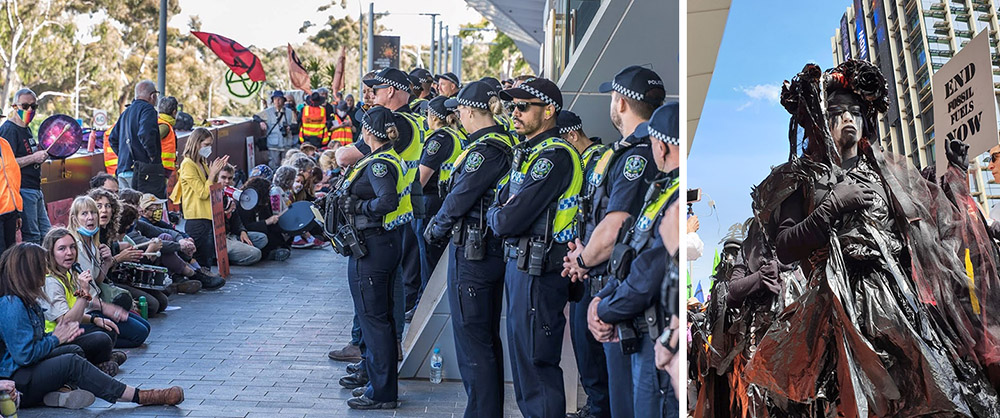
Police block access to the Asia Pacific Oil & Gas conference. Right: The magnificent ‘Oilies’ join the Adelaide protest. Photos: Peter Barnes & Ella Ma.
The day after the conference, rebels attended the State Government’s Roundtable on Oil and Gas. They interrupted the Minister for Energy and Mining’s address by locking and glueing themselves to doors inside the venue. Once the room was finally cleared of protesters, the Minister spoke off the cuff to the oil and gas industry, saying “make no mistake, (the protesters) are having an impact”.
And yet the impact has not been enough to trigger Australia’s divorce from fossil fuels - meaning new rebel actions are already in the making. Find out more about the next wave and sign up on the XR Australia website.
Action Roundup
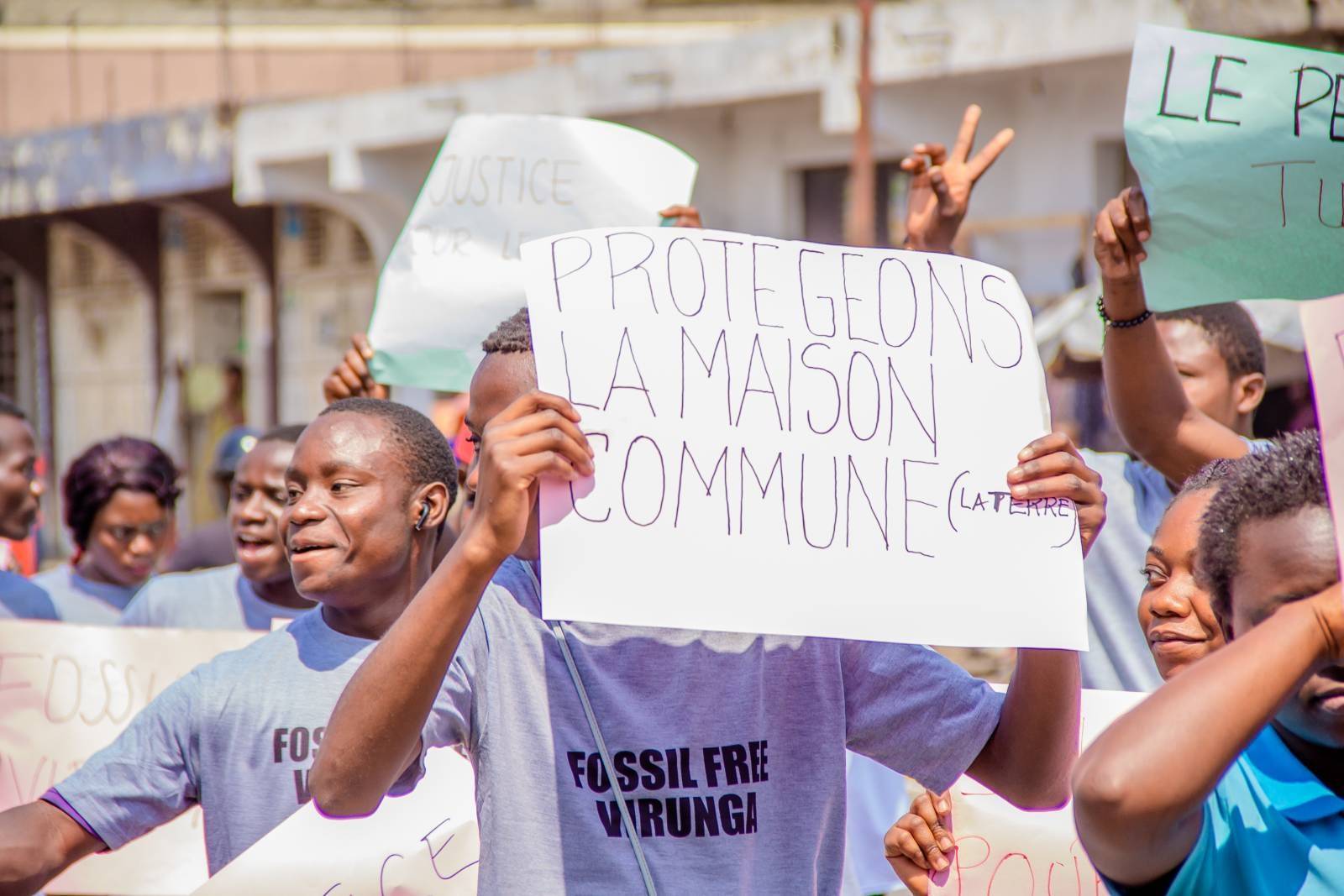
5 OCT | Goma, DRC: Rebels march on the final day of the Pre-COP summit, which was being held in the capital Kinshasa. Police reacted violently to the peaceful protest. One rebel was hospitalised after being beaten. Thankfully, he made a full recovery. Sign: Protect The Common Home (The Earth)
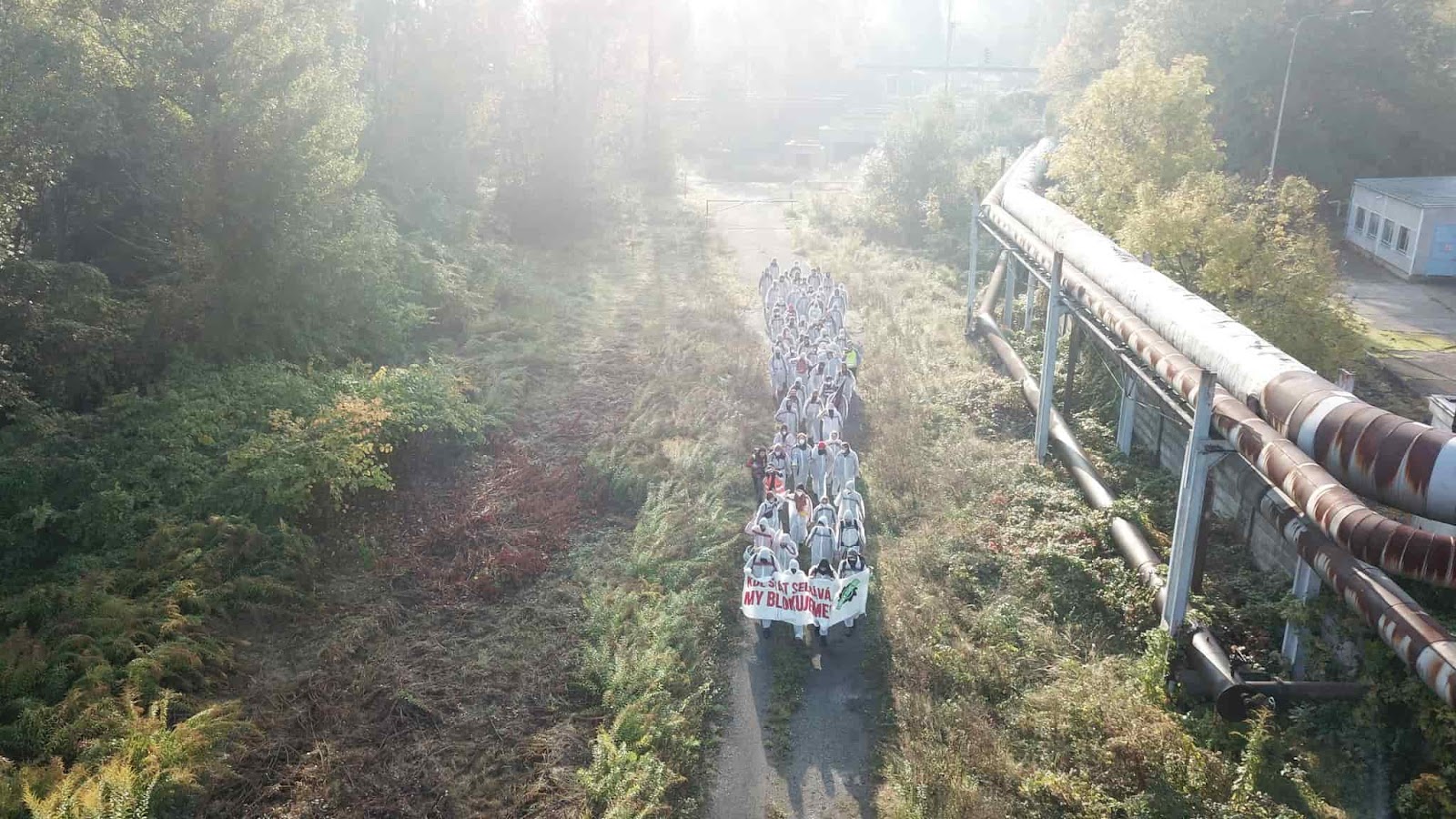
8 OCT | Ostrava, Czech Republic: End Coal Now activists occupy Svoboda coal plant. The action was launched after a week-long climate camp in the region.
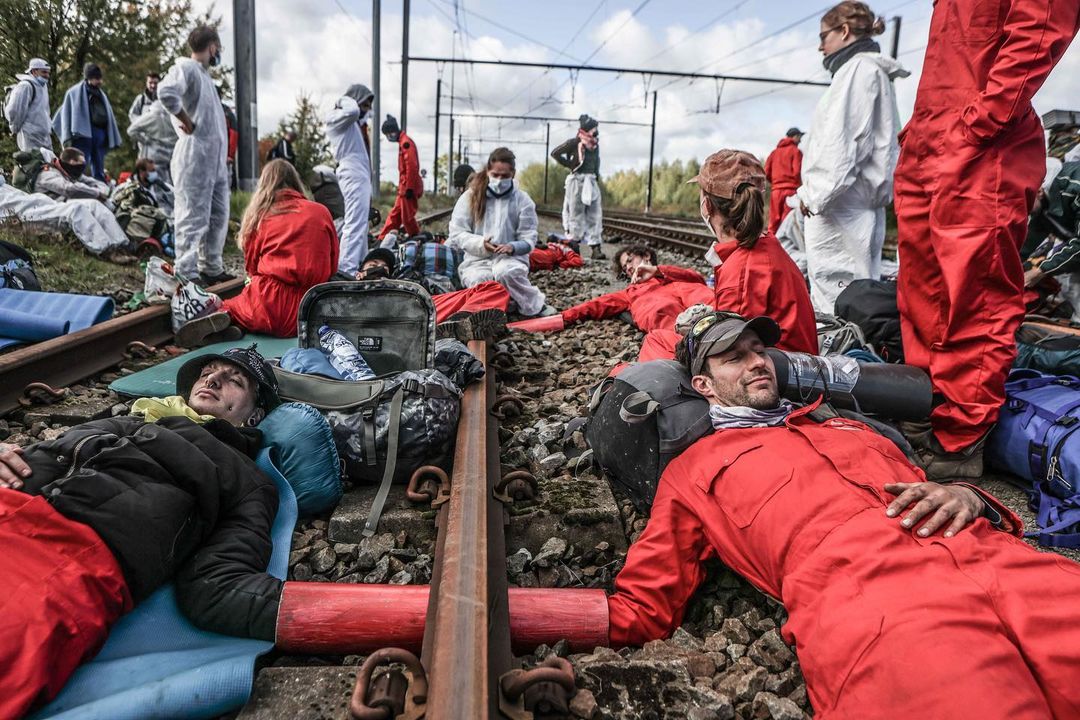
8 - 9 OCT | Feluy & Liege, Belgium: Rebels joined more than 1000 activists to blockade two oil refineries belonging to Total Energies. The action, organised by Code Rood, was one of Belgium’s largest ever acts of civil disobedience and lasted two days.
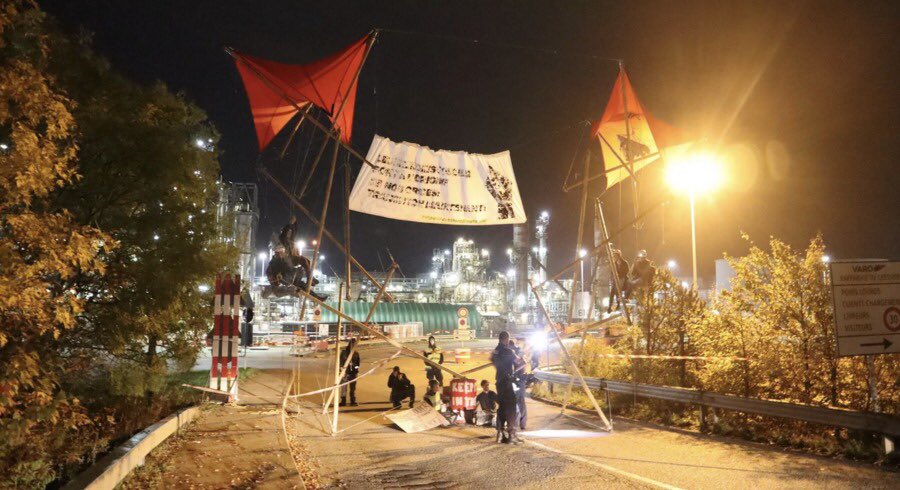
10 OCT | Cressier, Switzerland: Activists from Debt For Climate (including rebels) shut down Switzerland’s only oil refinery to highlight the country’s colonial legacy and demand solidarity with the Global South. The blockade used the world’s first ‘Hanging Beacon’ - an elaborate contraption jointly designed by a rebel and a D4C activist.
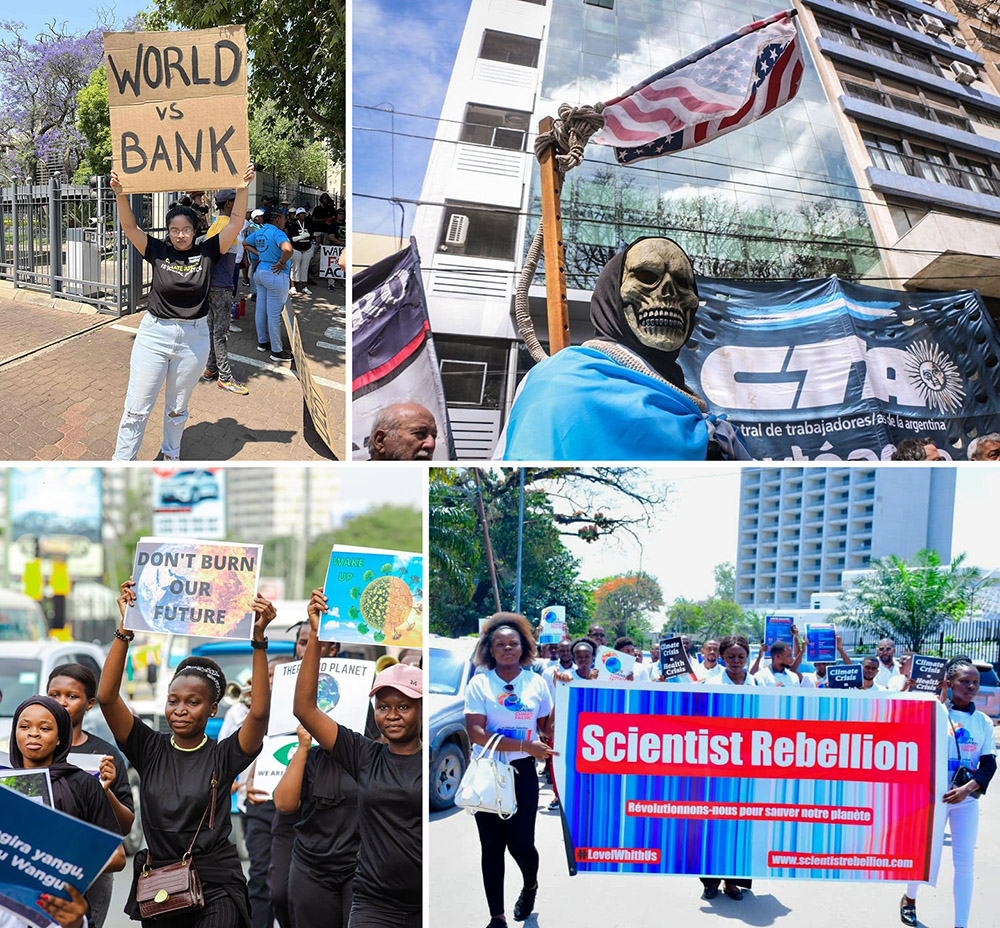
14 - 25 OCT | Worldwide: Last month saw D4C and Scientist Rebellion campaigns that were global in scope. D4C highlights include solidarity actions in South Africa and Argentina (top). Scientist Rebellion held marches in Dar es Salaam, Tanzania and outside the German Embassy in Kinshasa, DRC (below).
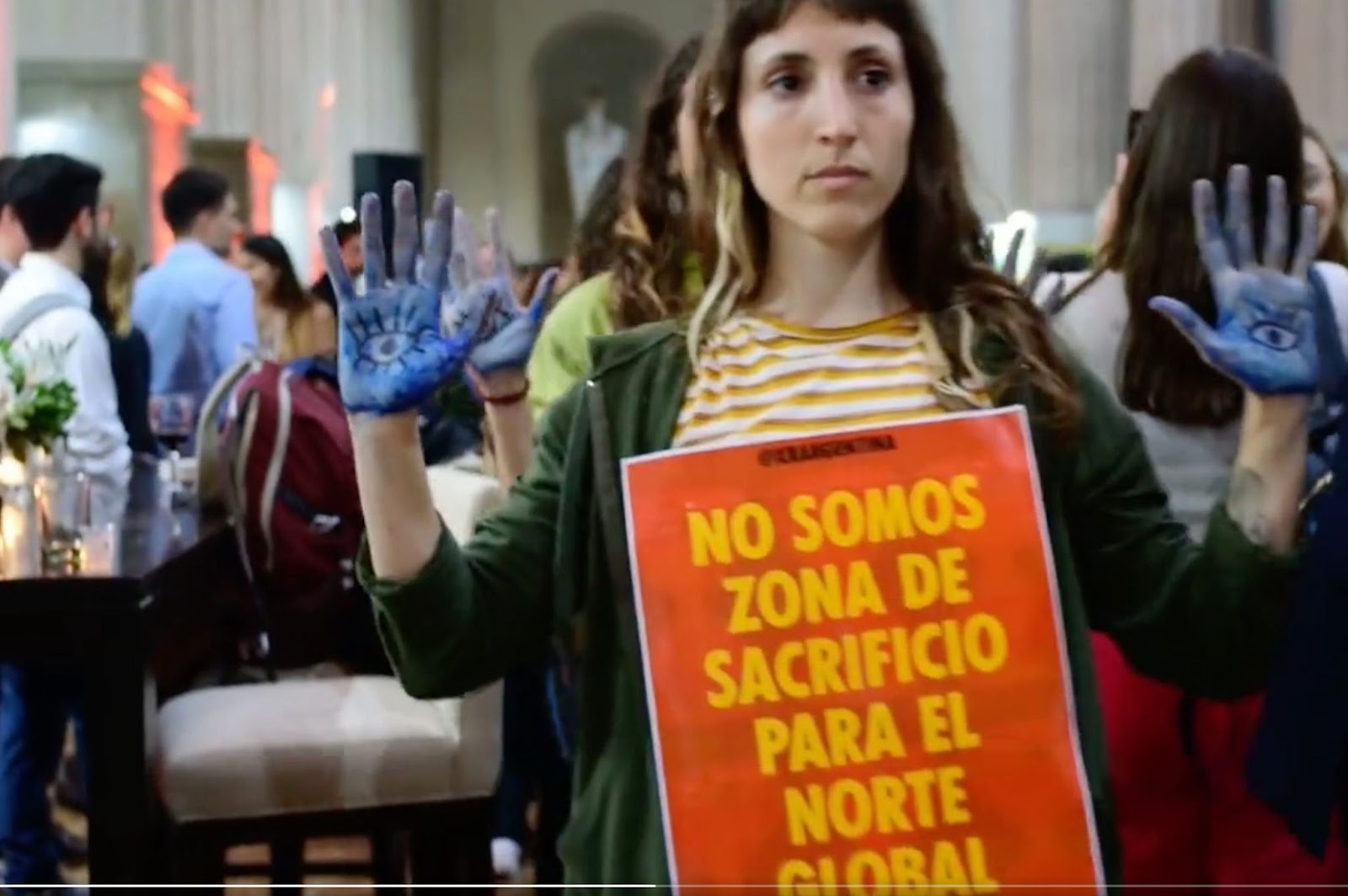
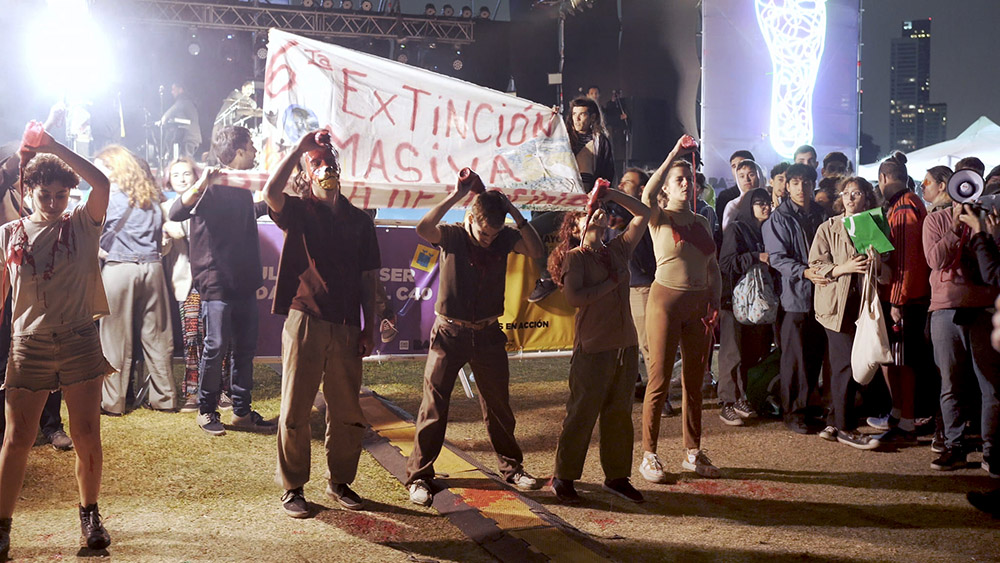
21 OCT | Buenos Aires, Argentina: Rebels disrupt the C40 Summit, which brings together more than 100 mayors from around the world to discuss (then do nothing about) the climate crisis.

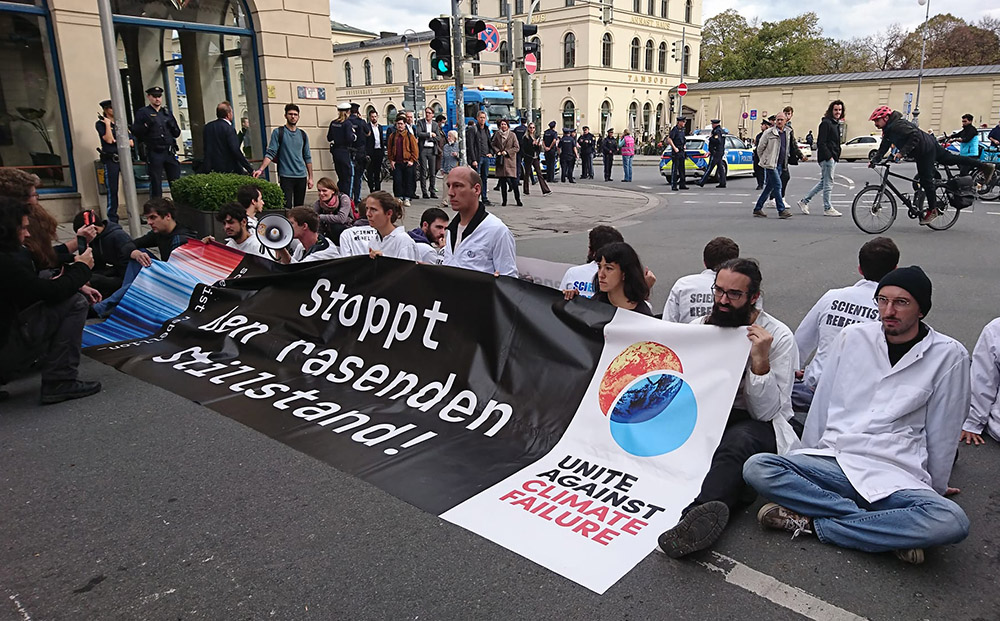
20/29 OCT | Wolfsburg/Munich: Nine Scientist Rebellion activists glue themselves to the Porsche pavilion of the Volkswagen car museum, calling for a 100 km/h speed limit and other measures to drastically reduce German transport emissions. The action became a two-day occupation. A week later, 16 scientists were arrested for glueing themselves to a BMW dealership and blocking an intersection in Munich. All 16 were imprisoned, some for up to 7 days, while awaiting trial.

OCTOBER | Europe: Last month saw peaceful climate protesters imprisoned across Europe. 16 rebel scientists in Munich faced up to a week in prison, while 13 members of Last Generation are still in preventative detention in the city, and could stay there for up to a month. 6 Just Stop Oil protesters are imprisoned in the UK either awaiting trial or serving sentences, and 3 more supporters were sentenced to 2 months in jail in Holland. Finally, 2 Swedish rebels who occupied an airport runway last October have been sentenced to 2 months in jail - the first time peaceful activists have ever been imprisoned in Sweden. Both are parents to young children.
So much happened this month, we can’t fit it all into one newsletter. Head over to NEWSLETTER XTRA to find out about actions in Nigeria, Panama, India & more. NEWSLETTER XTRA: A feast for the eyes and extra fuel for the soul!
Solidarity Corner: Just Stop Oil
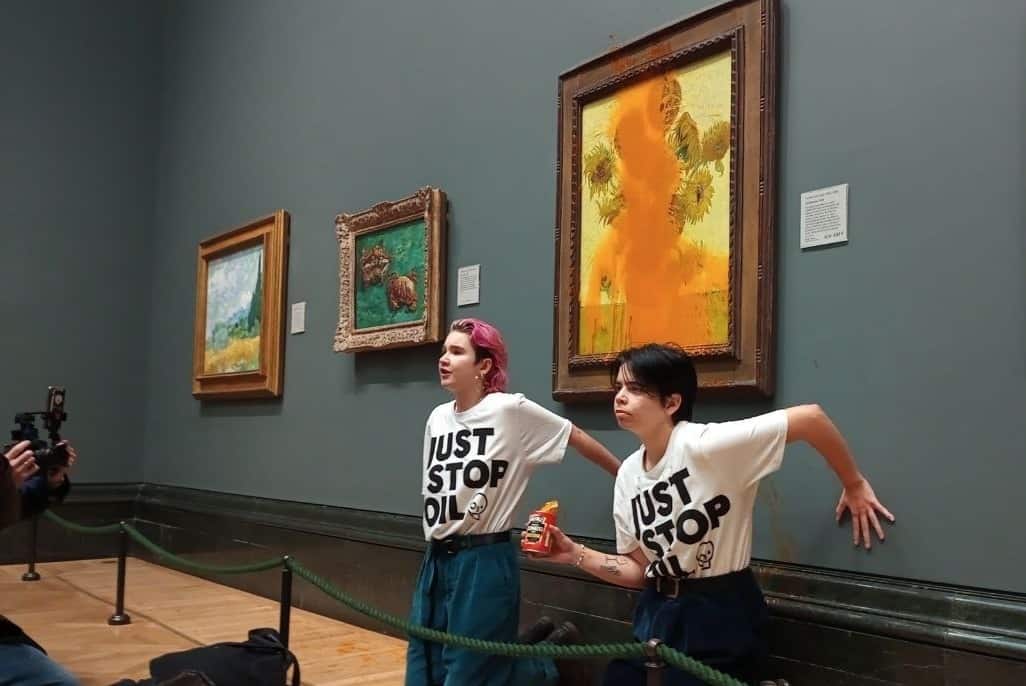
Van Gogh’s Sunflowers was not harmed, but the outcry was worldwide.
Last month Just Stop Oil declared Westminster, home of the UK government, a site of nonviolent civil resistance. They promised to return day after day until their demand - that the government stop all new oil and gas projects - was met.
What followed was an extraordinary 32 days of continuous action across the capital. The bold tactics of a committed band of people garnered global attention, triggered fierce debate, and resulted in 718 arrests.
While it was the small but provocative actions that grabbed the headlines - the soup thrown at Van Gogh’s Sunflowers, the scaling of bridge masts 84m high - it was road blockades that formed the bulk of the campaign. The conviction and resilience needed to take part in these blockades should not be underestimated.
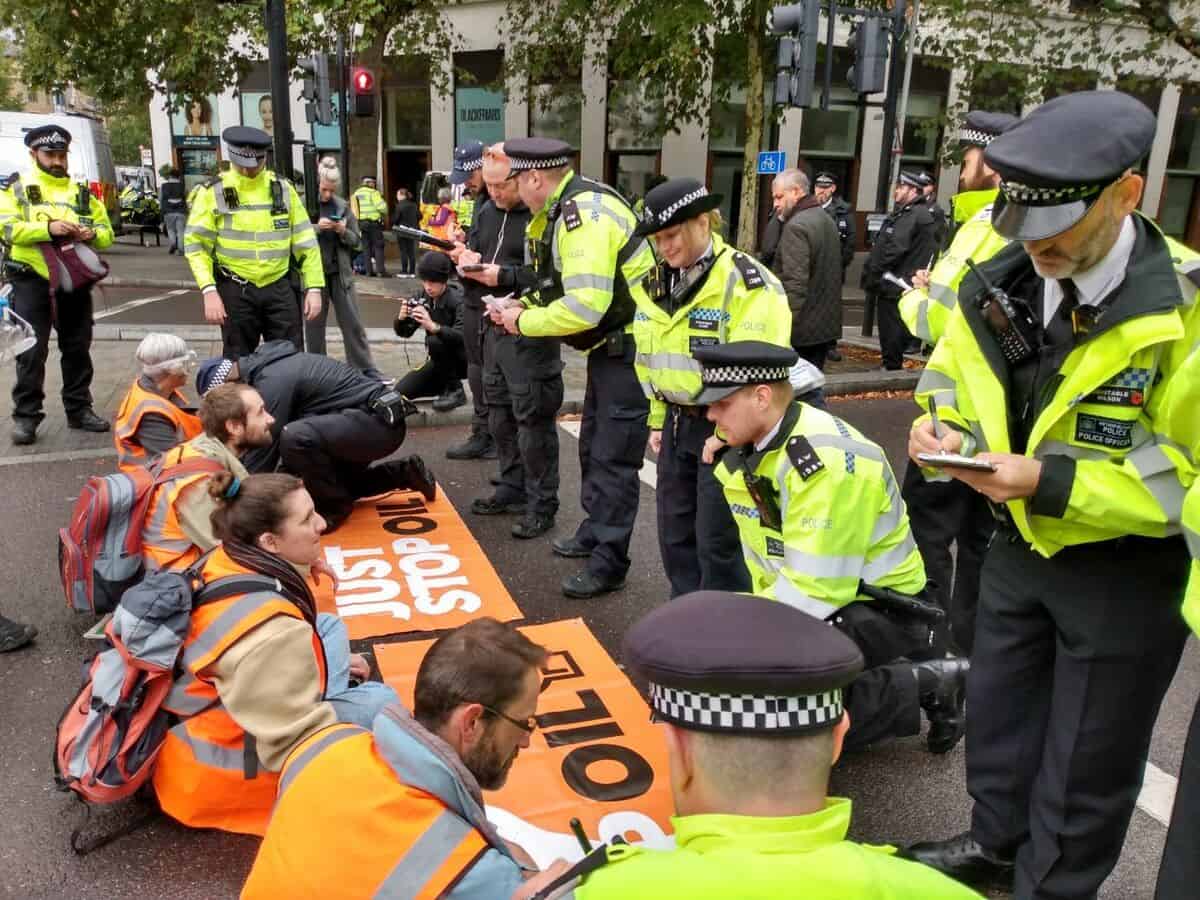
Road blockades are stressful but empowering and require a lot of careful planning.
The resistance campaign started with Just Stop Oil joining climate, socialist, workers, anti-war, and anti-racist groups to march into Westminster. Thousands demanded an end to the climate crisis and the related cost of living crisis, with UK households suffering sky-high energy bills because of government incompetence.
But the huge turnout wasn’t replicated for the road blockades that followed. With the resultant disruption failing to induce policy change or media scrutiny, Just Stop Oil had to get inventive. Small, provocative actions targeting artworks were launched.
No artworks were damaged, but the actions were criticised by many, even those within the climate movement. The fear was that the public would not just recoil from the tactics, but the cause itself.
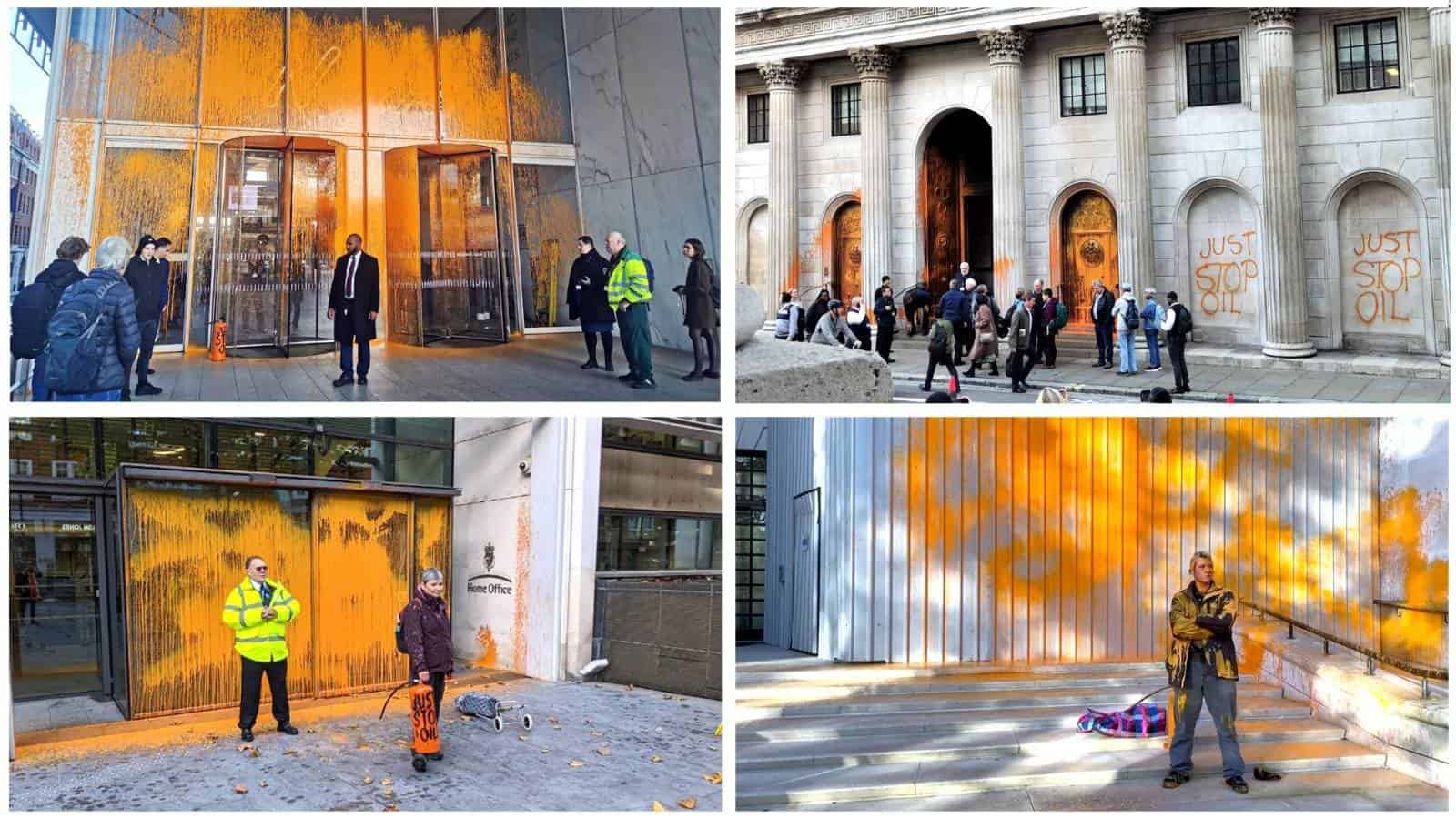
Various institutions culpable for the climate crisis were sprayed with orange paint, inc. media giant News Corp, the Bank of England, the Home Office & MI5.
Thankfully, the evidence shows that is not the case. Negative media attention on protesters doesn’t harm the underlying cause, does create space for debate of the wider issues, and increases support for the more moderate flanks of the same cause.
Just Stop Oil has seen a big upturn in new recruits since the Van Gogh action, and that’s despite repressive new laws that mean prison time and higher fines are more likely for peaceful but disruptive protest. Six Just Stop Oil activists are currently in prison awaiting trial or serving sentences (read the statements of two of them).
With the UK government still planning to extract oil and gas from the North Sea, Just Stop Oil’s civil resistance will continue. Motorway blockades are planned across the country. As one activist puts it, “We can’t be obedient to a system that is killing us”. We at this newsletter salute the activists of Just Stop Oil for their bravery, empathy, and resilience, and give them our unwavering solidarity.
Read more about the Just Stop Oil campaign and donate to their crowd funder.
Book of The Month:
The World as We Knew It: Dispatches from a Changing Climate, ed. by Amy Brady & Tajja Isen
The World as We Knew It is a collection of essays about personal experiences of climate change from various authors.
A woman describes her intense connection to her home, a desert valley whose saguaro cactuses are gradually dying—and not being replaced by young seedlings—because of chronic drought.
Another begins by describing the invasion of lionfish in Dominican waters, segues into Superstorm Sandy, gender identity, and family dynamics, and ends up on a sand dune in Senegal with her partner under the stars. “Because without these dreams, I do not know how to live”. Another discusses sexism and identity in Antarctica. And on and on.
Not all the authors are women, but many of them are. Some of the stories discuss climate directly, but many of them don’t. One striking aspect of this book is how many of the authors are not Anglo-Americans or white Europeans—to a large extent, this book is a record of perspectives that tend to get drowned out.
It’s a book best read gradually, perhaps one essay or two at a time, with plenty of time to think about and sit with each one. It’s a book largely without answers. It’s a book to read to remember that you’re not alone.
Avoid Amazon. Support local bookshops by buying books at Bookshop or Hive.
Announcements
Solarpunk Showcase 2023!
Launching Soon

We can’t stop the future, but here’s a chance for writers of all ages to both imagine and help shape the world they’d want to live in. Extinction Rebellion Wordsmiths is opening its second round of Solarpunk storytelling following last year’s successful showcase.
Light up your imaginations, picture a world where we are more in harmony with nature and ourselves, and have also found the technology to help that happen – that is Solarpunk in action!
Today, people are trying to decode whale sounds and electrical signals between fungi. What if they succeeded? In a world where we already carry a computer in our purses, what extraordinary inventions will create this Solarpunk future?
If you’re new to Solarpunk, read some of our favoured entries from last year. If you’re familiar with it… start imagining!
For more information and inspiration, head to our Solarpunk Storytelling Showcase.
Lights, Camera, Climate Action!
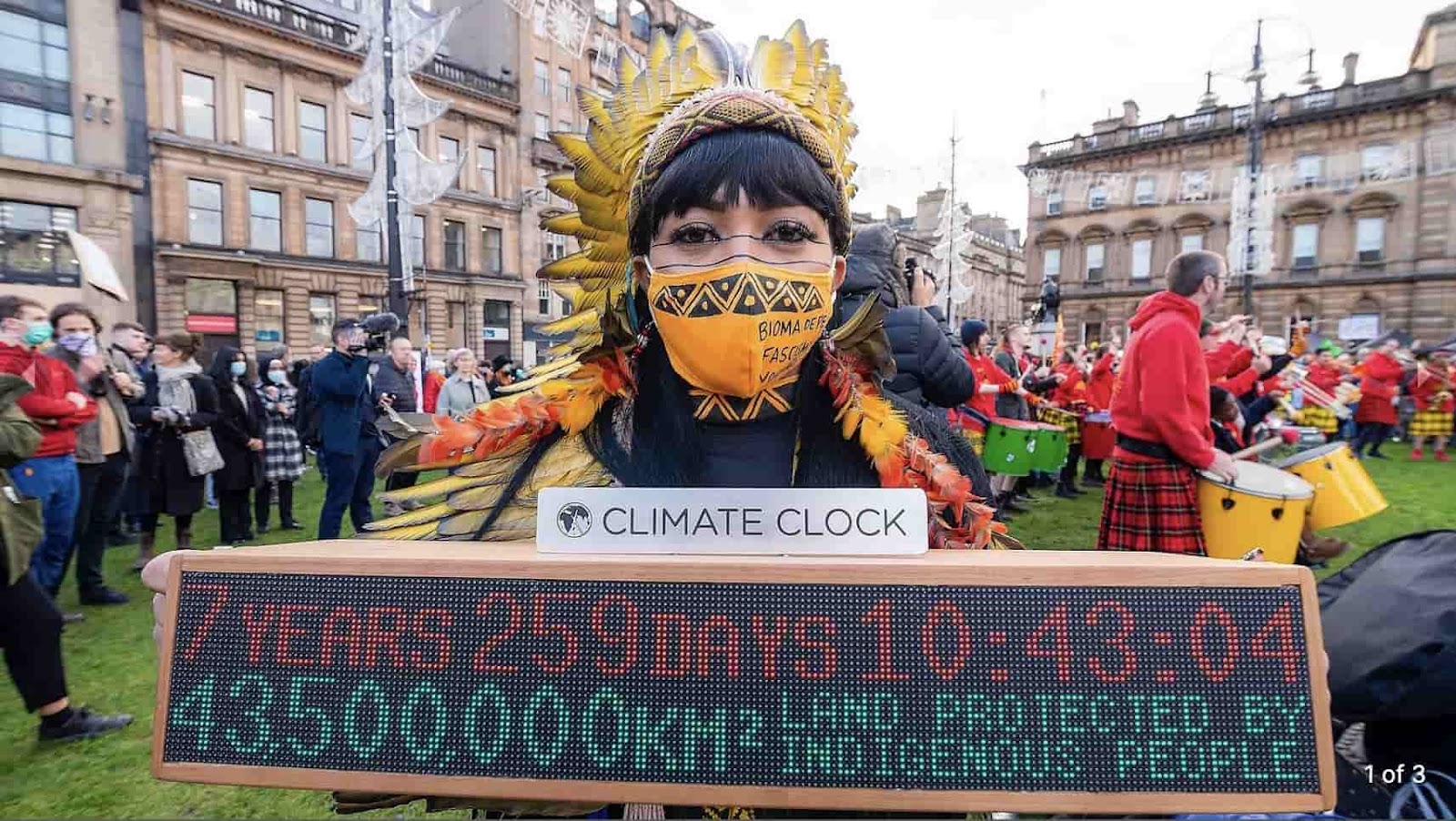
This month, the UN's environmental agency has said that there is “NO credible pathway to 1.5C“ because of a lack of political will.
So what’s the plan? Imagine a documentary film designed to motivate thousands of new rebels into civil disobedience, in a Global Emergency Call to Direct Action that inspires billions of people to take part.
An ambitious film for system change like no other. Made by grassroots climate action designers and filmmakers.
DONATE: If, like us, you believe in people power, then please give generously to get this exciting new project moving.
FOLLOW: Follow our progress via our social media channels.
EMAIL: If you think you can help us, contact GetAJobCollective@proton.me
Thank you
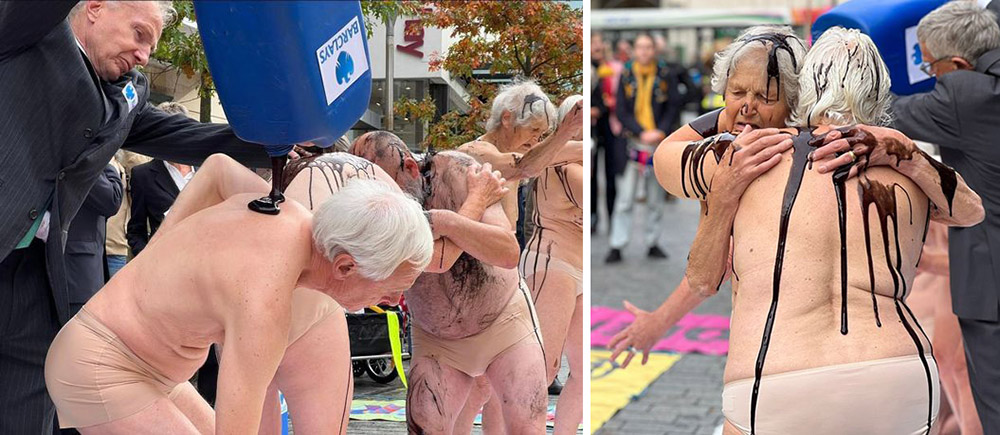
29 OCTOBER | Exeter, UK: Five elderly rebels get doused in fake oil outside a branch of Barclays Bank. One said: "I’m 70. I don’t want to have to take my clothes off in the High Street in order to draw attention to the fact that Barclays Bank continues to invest in fossil fuels, but I have a 4-year-old granddaughter and I will do everything I can to protect the world and her future.” Photos: Shirley Bebbington
Thank you for reading, rebel. If you have any questions or feedback, we want to hear from you. Get in touch at xr-newsletter@protonmail.com.
Get involved in XR wherever you are! Check out our global website, learn more about our movement, and connect with rebels in your local area.
The Global Newsletter is brought to you by XR Global Support, a worldwide network of rebels who help our movement grow. We need money to continue this crucial work. Your donations, big or small, are much appreciated.